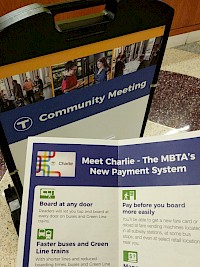Happening Now
At What Cost?
February 27, 2019
Are we seeing value in fare hikes?
by Joe Aiello | Northeast Field Coordinator
This is beginning to feel like I’m in the 3rd Inning of a Ken Burns’ documentary. First I wrote about making the hard choices, then I covered the need for vision - and now I’m hitting on the price we pay for service.
(Next week it will be about the all-time greatest first baseman, I promise)
The news broke this afternoon (while all eyes were on the Rayburn HOB) that the MTA board in New York approved a biyearly hike that would keep the base fare at $2.75, but raise the price of monthly passes and eliminate the MetroCard bonuses. This would also raise the price of a commuter rail ticket by 4%
From the NYTimes article:
The city’s transportation commissioner, Polly Trottenberg, said it was a difficult decision to raise fares, but that fares needed to keep up with inflation.
“I don’t think anyone relishes this vote today, but I think it’s important to keep this agency running,” said Ms. Trottenberg, who also serves on the board.
The MBTA here in Boston has been kicking around the idea of a fare hike for the last couple months (would be the first since 2012) and is in the middle of a public hearing tour gathering comments on the fare hike and the upcoming “Charlie Card 2.0” payment system.
The MBTA’s proposal has brought out a variety of opinions - ranging from the agency's own GM, Steve Poftak, defending the hike as the “fair way to improve the MBTA” to Boston City Councilor Michelle Wu’s op-ed calling for the system to be free. One of Councilor Wu’s suggestions is the notion of a monthly fare-capping policy, akin to the daily cap that the London Underground currently has.
From a passenger perspective, there are a slew of improvements coming to the T over the next couple of years that (yikes!) might warrant the increase. The Green Line Extension, new car sets on the Red, Green, and Orange lines, and the new Charlie Card system I mentioned above are just a few of the upcoming items.
Paftak says it himself:
A fare increase, including the modest one now being proposed, is never an easy or popular decision, but it will enable the MBTA to continue building on its progress made over the last four years to improve reliability for customers.
As long as you can physically show us something for the money, then the increase is (somewhat) easier to swallow. Doing it just because you need to backpay a bunch of stuff that wasn’t done during the last increase when you promised a bunch of stuff just isn’t going to cut it. You want our money? Get better. At least show that you are trying.
On the other hand, it's pretty rich that transit users get to pay fares indexed to inflation, while the Federal gas tax has stalled on that front since 1993, and yet the road system keeps on expanding.
While these are all local issues for NY and Boston (I’m sure our friends in Chicago, San Francisco, and Atlanta know the pain), all of this got me thinking of how Amtrak handles this… or rather, how WE handle it. Fares in other parts of the country make Amtrak a relatively affordable option -- but fares on the North East Corridor can be outrageously high, as are fares in sleeping cars. Rail Passengers member Jim Loomis talked about the falling value in Amtrak high price tickets. Yet ridership keeps materializing to fill the trains, which can only serve as further proof of demand for service. What justifies the expense for you? What would continue to justify it? Would more daily trains help? New train sets? Faster trains? Stronger corridor service?
As consumers, this is another way to frame some of what we'll be talking about in DC….
Now we're on to the 4th, no score.

"We would not be in the position we’re in if it weren’t for the advocacy of so many of you, over a long period of time, who have believed in passenger rail, and believe that passenger rail should really be a part of America’s intermodal transportation system."
Secretary Ray LaHood, U.S. Department of Transportation
2011 Spring Council Meeting

Comments